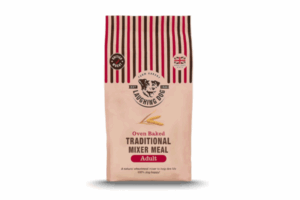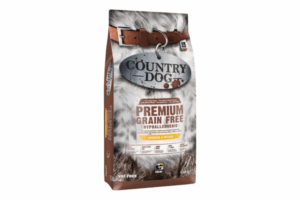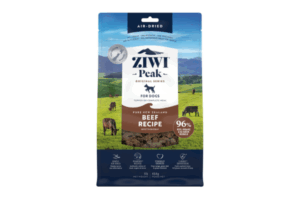If you’re doing your weekly shop at Tesco and wondering whether their own-brand dog food is worth adding to your trolley, you’re not alone. As a dog food specialist, I get asked about supermarket brands all the time, and Tesco’s dog food range is one that comes up regularly. The appeal is obvious – it’s convenient, affordable, and promises complete nutrition. But does it actually deliver what your dog needs?
Let me be upfront: Tesco dog food is designed for budget-conscious pet owners who want a basic, nutritionally complete option without the premium price tag. It’s not going to win any awards for ingredient quality, but it’s not trying to. The question is whether it’s adequate for your four-legged friend, and that depends on several factors I’ll walk you through.
What’s Actually in Tesco Dog Food
The first thing that strikes me about Tesco’s dog food is how cereals dominate the ingredient list. In their dry food varieties, cereals come first, followed by “meat and animal derivatives” at around 22%, with only 4% being named meat like chicken or beef. This is pretty typical for budget supermarket brands, but it’s worth understanding what this means for your dog.
The protein content sits at 21% for dry food and 8.5% for wet food, which meets the minimum requirements but isn’t particularly impressive. What concerns me more is the vague labeling – “meat and animal derivatives” could be anything from muscle meat to less digestible by-products, and Tesco doesn’t specify which.
Their wet food range includes varieties like beef, chicken, lamb, and turkey, but again, we’re looking at generic “meat and animal derivatives” making up 42% of the content. I’ve also noticed they add “various sugars” to their wet foods, which is something I’d personally prefer to avoid in dog food.
The Complete Product Range
Tesco offers both dry and wet food options across different life stages. Their dry food comes in bags ranging from 12kg to 15kg, with varieties like Beef & Vegetable, Chicken & Vegetable, and a Senior formula. The wet food is sold in multipacks of canned “loaf” selections.
What I appreciate is that they’ve covered the basics – adult, senior, and small breed options – though the formulations don’t vary dramatically between them. The pricing is competitive, with dry food starting from around £0.83 per kg, making it one of the more affordable complete foods on the market.
If you’re comparing budget options, you might also want to consider other supermarket brands. Not sure whether to choose Tesco or a more premium option? Read our Dog food from Eden review to see how natural, single-protein options compare.
Nutritional Quality and Concerns
From a nutritional standpoint, Tesco dog food does what it says on the tin – it provides complete and balanced nutrition that meets UK regulatory standards. However, there are several areas where I have concerns as a specialist.
The heavy reliance on cereals means your dog is getting a significant portion of their protein from plant sources rather than animal sources. While this isn’t inherently harmful, dogs are naturally carnivorous and typically thrive better on animal-based proteins. The ash content is also on the higher side at 8-9.5%, which could potentially strain the kidneys over time.
I’m also not thrilled about the synthetic fortification approach. The food relies heavily on added vitamins and minerals rather than deriving nutrients from whole food sources. The omega fatty acid profile is minimal too, with just 0.2% omega-3, which explains why some owners report dull coats in their dogs.
What Dog Owners Are Saying
The feedback on Tesco dog food is pretty mixed, which is what I’d expect from a budget brand. Some owners report that their dogs do absolutely fine on it – they maintain healthy weights, seem energetic, and show no obvious health issues. These tend to be owners of adult dogs without specific dietary sensitivities.
However, I’ve also seen reports of coat and skin issues, with some dogs developing dull, dry coats that improve when switched to higher-quality foods. There have been mentions of digestive upset too, though this could be related to the transition process rather than the food itself.
One thing that stands out is the batch inconsistency some owners have noticed – variations in kibble color and texture that suggest manufacturing quality control issues. This isn’t uncommon with budget brands, but it’s worth being aware of.
Comparing Value for Money
When it comes to price-to-quality ratio, Tesco performs exactly as you’d expect. You’re getting basic nutrition at a fraction of the cost of premium brands. A 16kg dog would cost roughly £0.24 per day to feed, which is significantly less than most alternatives.
However, this comes with trade-offs. The protein quality isn’t as high, the ingredient transparency is poor, and you’re missing out on the functional ingredients that many premium foods include. It’s a classic case of getting what you pay for – not bad for the price, but not exceptional either.
The convenience factor is genuinely valuable though. Being able to pick up dog food during your regular grocery shop saves time and effort, especially if you’re not dealing with any specific dietary requirements.
Sustainability and Ethics
One area where Tesco deserves credit is their sustainability initiatives. They’ve reduced food waste by 45% since 2016 and are exploring innovative approaches like insect protein derived from food waste. This circular economy approach is genuinely forward-thinking and addresses some important environmental concerns.
The ethical transparency could be better though. The vague labeling around meat sources makes it difficult to know exactly what you’re feeding your dog, and there’s no country-of-origin information for the meat components.
What Kind of Dogs is This Food Suitable For
Tesco dog food is best suited for healthy adult dogs without specific dietary sensitivities. If you have a relatively inactive dog who doesn’t have any health issues, allergies, or special requirements, it could work perfectly fine as a budget-friendly option.
I’d be more cautious about using it for puppies, senior dogs, or active working dogs. Puppies need higher protein quality for proper development, seniors often benefit from more digestible proteins, and active dogs require better nutrient density than what Tesco typically provides.
Dogs with sensitive stomachs or skin conditions might also struggle with the cereal-heavy formulation and various additives. The added sugars in the wet food make it less suitable for dogs with weight management issues or dental problems.
If you’re looking for a transitional food or something to have on hand for emergencies, Tesco dog food serves that purpose well. It’s also reasonable for supplementing a fresh food diet or as an occasional alternative when your usual brand isn’t available.
Final Conclusion – Is This Dog Food Good
As a dog food specialist, I’d describe Tesco dog food as adequate but unremarkable. It does what budget dog foods are designed to do – provide basic nutrition at an affordable price point. It’s not going to harm most healthy dogs, but it’s also not going to optimize their health and wellbeing.
The cereal-first formulation, vague meat sourcing, and added sugars are all red flags for me from a nutritional standpoint. While the food meets regulatory standards, it falls short of what I’d consider species-appropriate nutrition for dogs. The heavy reliance on synthetic vitamins and minerals also suggests the base ingredients aren’t providing adequate natural nutrition.
That said, I understand that not everyone can afford premium dog food, and Tesco serves an important market segment. If budget is your primary concern and you have a healthy adult dog, it’s a reasonable choice. I’d just recommend supplementing with some fresh ingredients where possible and monitoring your dog’s coat, energy levels, and overall condition.
For dogs with any health issues, sensitivities, or special requirements, I’d definitely recommend investing in a higher-quality food. The long-term health benefits typically justify the additional cost, and you’ll likely see improvements in coat condition, energy levels, and overall vitality.
Find the Perfect Food for Your Dog
Every dog is unique, and so are their nutritional needs. What works for one dog might not be ideal for another, which is why it’s important to choose dog food based on what your specific dog truly needs. Factors like age, activity level, size, and any health conditions all play a role in determining the best diet.
That’s why we’ve created a comprehensive questionnaire where you can fill in details about your dog and receive completely free recommendations for the three best dog food brands specifically chosen for them. It takes less than a minute to complete and considers all the important factors that influence your dog’s nutritional requirements. You can access our questionnaire via this link and get personalized recommendations tailored to your four-legged friend.






